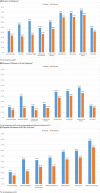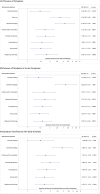Patient-reported outcomes in older breast cancer survivors with and without prior chemotherapy treatment
- PMID: 37551136
- PMCID: PMC10524015
- DOI: 10.1002/cam4.6394
Patient-reported outcomes in older breast cancer survivors with and without prior chemotherapy treatment
Abstract
Background: Little is known about long-term treatment-related symptoms in older breast cancer survivors. We characterized long-term patient-reported symptoms and examined factors associated with the presence and severity of symptoms, and symptom interference with daily activities.
Methods: Texas Cancer Registry (TCR) Medicare linkage data was used to identify breast cancer patients age 65 and older with local/regional stage disease diagnosed between 2012-2013. Symptom burden was assessed using breast-specific items from the Patient-Reported Outcomes version of the Common Terminology Criteria for Adverse Events (PRO-CTCAE™). Demographic and clinical data also were collected. Logistic regression models were used to assess the association between symptom burden and respondent sociodemographic and clinical characteristics.
Results: Of 4448 eligible patients, 1594 (response-rate 35.8%) completed questionnaires. Of these, 1245 eligible respondents were included in the analysis based on self-reported data. Median time from diagnosis to survey completion was 68 months (IQR: 62-73). Most frequently reported symptoms were fatigue/lack of energy (76.8%), aching muscles (72.1%) and aching joints (72.5%). Receipt of chemotherapy was associated with higher symptom burden. Patients treated with adjuvant chemotherapy had higher risk of numbness/tingling (OR: 3.16; 95% CI: 2.36-4.24), hair loss (OR: 2.72; 95% CI: 2.05-3.60), and fatigue/lack of energy (OR: 1.80; 95% CI: 1.29-2.52). Similarly, patients who received chemotherapy were more likely to report the majority of symptoms as moderate to severe and as interfering with daily activities.
Conclusion: Receipt of chemotherapy is associated with significant symptom burden more than 5 years after breast cancer treatment. Long-term chemotherapy impact should be discussed with patients in a shared-decision making process and approaches to symptom management during survivorship care are needed.
Keywords: breast cancer; geriatric oncology; survivorship.
© 2023 The Authors. Cancer Medicine published by John Wiley & Sons Ltd.
Conflict of interest statement
None.
Figures



References
-
- DeSantis CE, Ma J, Gaudet MM, et al. Breast cancer statistics, 2019. CA Cancer J Clin. 2019;69(6):438‐451. - PubMed
-
- American Cancer Society . Cancer facts and figures 2019–2020. 2019. –2020 https://www.cancer.org/content/dam/cancer‐org/research/cancer‐facts‐and‐...
-
- American Cancer Society . Cancer treatment & survivorship facts & figures 2019–2021. Accessed November 11, 2021. https://www.cancer.org/content/dam/cancer‐org/research/cancer‐facts‐and‐...
-
- Early Breast Cancer Trialists' Collaborative Group (EBCTCG) , Peto R, Davies C, et al. Comparisons between different polychemotherapy regimens for early breast cancer: meta‐analyses of long‐term outcome among 100,000 women in 123 randomised trials. Lancet (London, England). 2012;379(9814):432‐444. - PMC - PubMed
-
- Muss HB, Woolf S, Berry D, et al. Adjuvant chemotherapy in older and younger women with lymph node–positive breast cancer. JAMA. 2005;293(9):1073‐1081. - PubMed
Grants and funding
LinkOut - more resources
Full Text Sources

